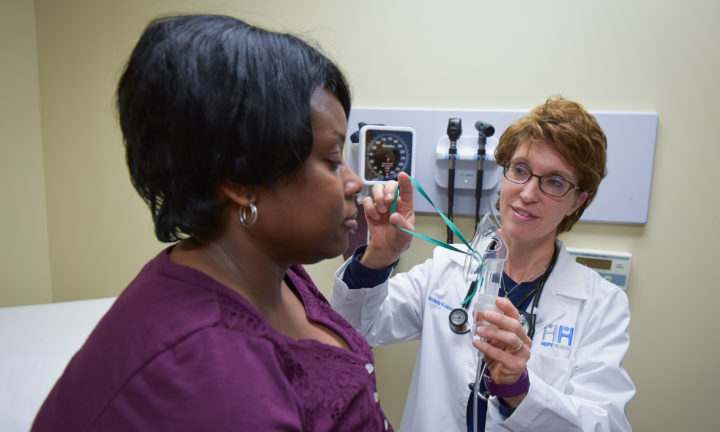Flooding’s Ripple Effect: Once Waters Recede, Health Problems Can Rise

Flooding is more than just the inconvenience of missing time from work and school and the cleanup of the aftermath.
Flooding also has devastating short- and long-term effects on our well-being and health.
In South Carolina, we experienced a hurricane followed by devastating flooding only seven months ago.
We experienced heavy flooding with more than 11 trillion gallons of water swamping North Carolina and South Carolina. In Williamsburg County, one of the most heavily affected areas last year, more than 27 inches of rain fell over a 48-hour period. Most areas had to deal with heavy rainfall, flooding, contaminated water, no potable water or power and the cleanup and rebuilding afterward.
Flooding is the major cause of death associated with natural disasters in the United States, with most deaths caused by drowning. Flash flooding, rapidly rising water levels, and motorists attempting to cross moving flood waters are particularly deadly.
But the other causes of death or injury include hypothermia, animal bites, electrocution from down lines and appliances in homes, burns and carbon monoxide poisoning from gas-powered generators not ventilated properly.
Flooding can also disrupt services at health care facilities with the loss of infrastructure (water and electricity) increasing the difficulty of providing care for patients with chronic and acute conditions, health risks associated with evacuation of patients from facilities and loss of supply of medications and needed oxygen.
What does this mean for our health?
We think short term in regard to infection, but for those that are immunocompromised or elderly, even just one week without access to sources of nutrition that are safe can have a medical impact, let alone if this extends to two to three weeks in areas that cannot be accessed easily. Without access to medications, nutrition and a clean water supply, malnutrition and exacerbation of chronic conditions have an opportunity to become widespread.
Respiratory conditions with cold and flu-like symptoms rise in the short and medium term following a flood. Once the roads have been damaged and people displaced to emergency settings, there is a disruption of access to medical services as basic as a pharmacy.
As people attempt to assess and clean up the damage, orthopedic injuries rise steadily. Acute medical care is needed for the increase in skin rashes, exacerbations of asthma and COPD, and power to continue necessary daily use of CPAP and oxygen equipment.
Ordinary medical conditions become more dangerous when medications cannot be obtained for simple conditions. For example, uncontrolled high blood pressure and diabetes during times of stress can lead to acute heart attacks, strokes, and impairment to function when blood sugars are very elevated.
Asthma is one of the conditions that becomes uncontrolled during this time. In the beginning, the first issue is that people lose access to their medications either because they have been lost in the flood, cannot be used without electricity or cannot be obtained without access to a pharmacy. Then, as time passes, the conditions are perfect for triggers that make asthma worse. Living conditions are left damp, mold and mildew develop, asthma flares and the risks for respiratory infections and distress increase.
What are even more important and often forgotten than the acute illness and injury are the long-term effects of flooding on the psychological health of individuals.
Flooding can challenge the psychosocial resilience of the hardiest of people. This emotional trauma continues long after the flood waters have receded. People have to deal with making repairs, cleaning up, dealing with insurance claims and the lack of support during the recovery process increases stress levels tremendously. Once evacuated from your home and the loss of personal possessions is experienced, this can undermine one’s sense of place, attachment, and self identity.
There is also a significant financial stress when days or weeks are missed from work, property is lost and necessary items such as clothing, food and transportation are destroyed, let alone housing. Watching and waiting for rivers to rise can increase anxiety every time it rains and, in some cases, symptoms of post-traumatic stress disorder can develop. People must carry on with their daily routines while still coping with the consequences of the flooding.
In adults, there are significant increases in depression, anxiety and psychological distress. There is also suggestion that children can show an increase in aggression, bedwetting and moderate stress symptoms. The response and resilience of caregivers directly impacts the children.
Most often, people seek the support of family to help get through disasters and emotional stress. When the disaster is more widespread and affecting many, that support system might become eroded.
To sum this up, there are a number of health impacts on communities from flooding and the aftermath that it causes. These encompass both physical and psychological. Take note of any symptoms you or a family member might be experiencing and follow up with your primary care provider.
For those living in Williamsburg County, HopeHealth has partnered with the American Red Cross to conduct a survey assessing respiratory conditions in the county and make people more aware of post-flooding conditions.
As a community, there are always assessments to be done to evaluate areas that can be improved and plans that can be put in place to help decrease the aftermath of these health risks.
Mother Nature cannot be controlled, but as a community we can foster support to others when the need arises.
This article first appeared on SCNOW’s The Morning News.